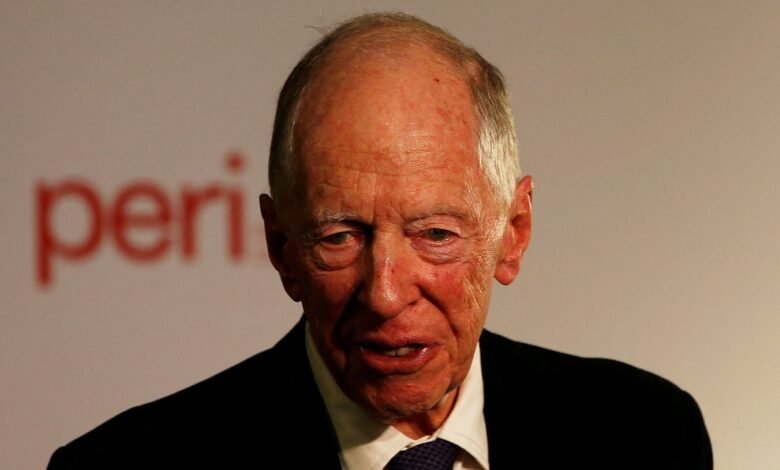Rothschild death sparks succession talk over his sprawling property and investment empire

Jacob Rothschild’s death yesterday at 87 could result in a Succession-style battle between his heirs for his sprawling property and investment empire.
A colossal figure in the City, he bestrode the Square Mile for several decades.
Starting at the family banking group NM Rothschild in 1963, he left 17 years later after falling out with his cousin Sir Evelyn de Rothschild over a merger with rival SG Warburg.
At the time, it was the talk of the town. One financial journalist described it as the ‘the most notorious bank-family split in City of London history’.
Striking out on his own, he took charge of RIT Capital Partners, which is worth £2.6billion and a stalwart of the FTSE 250.
His deal-making skills and easy charm saw the business grow fast, while his market commentaries were highly anticipated, such as when in 2019 he described the post-Brexit deadlock as the UK’s biggest political challenge since the 1956 Suez crisis.
While doing all this, he also co-founded wealth manager St James’s Place in 1991, money manager GAM in 1983 and made an unsuccessful bid for British American Tobacco in 1989, which, had it come off, would have been one of the biggest take-overs of all time.
A source close to the family said: ‘He was viewed as an establishment figure. Business-wise he was far from it. He took plenty of risks.’
To this day, RIT Capital remains one of the most popular trusts in London with offices based in Spencer House overlooking Green Park.
Its investments are varied and include WeBull, the New York investment platform, and Motive, the logistics group.
Related Articles
HOW THIS IS MONEY CAN HELP
In the UK, the firm backs technology investor Firstminute Capital. The annual return of 10.7 per cent remains impressive to this day and RIT has turned a £10,000 investment in 1988 to £345,000 in 2024.
But the big question is who will step into Rothchild’s shoes and what happens to his 13pc stake in the business.
To the Rothschilds, leadership succession is treated like that of an accession to the throne in a monarchy – not unlike the fictional Roy family in the popular TV series Succession.
It is an obsession that has enabled them to keep their name alive while other traditional City families – such as Kleinworts and Warburgs – have disappeared.
For many years, Nat, 52, appeared to be the natural successor, ‘a chip off the old block’ who moved effortlessly in the world of high finance. But his father disliked his playboy lifestyle and rebellious streak.
Born in 1971, he is the youngest child and as the only son is heir apparent. But he does not have a direct stake in RIT Capital, but instead holds an indirect holding through the family’s private equity firm Five Arrows.
He upset his parents in 1995 when he eloped with socialite Annabelle Neilson, but the marriage lasted just three years.
Relations with his family became strained and, in 2016, Nat refused to invite his father to his second wedding to former glamour model Loretta Basey.
He has since rebuilt his name with Volex, a cable manufacturer to Tesla.
But it is his sister Hannah, 61, an author, and Jacob’s eldest daughter, who has emerged as the frontrunner.
Known for her savvy and calm head, she has a 10 per cent stake in RIT and sits on the board as a non-executive director.
A divorced mother of three, she is also chairman of Yad Hanadiv, the Rothschild charitable foundation in Israel.
Whether Hannah or Nat win out, both will have big shoes to fill.
Some links in this article may be affiliate links. If you click on them we may earn a small commission. That helps us fund This Is Money, and keep it free to use. We do not write articles to promote products. We do not allow any commercial relationship to affect our editorial independence.
Source link





